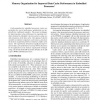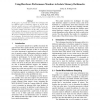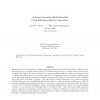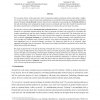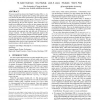EUROSYS
2010
ACM
14 years 11 months ago
2010
ACM
Effective use of CPU data caches is critical to good performance, but poor cache use patterns are often hard to spot using existing execution profiling tools. Typical profilers at...
ISSS
1996
IEEE
14 years 11 months ago
1996
IEEE
Code generation for embedded processors creates opportunities for several performance optimizations not applicable for traditional compilers. We present techniques for improving d...
SC
2000
ACM
14 years 12 months ago
2000
ACM
In this paper, we present and evaluate two techniques that use different styles of hardware support to provide data structure specific processor cache information. In one approach...
ISCA
2000
IEEE
14 years 12 months ago
2000
IEEE
For many applications, branch mispredictions and cache misses limit a processor’s performance to a level well below its peak instruction throughput. A small fraction of static i...
HPCA
2000
IEEE
14 years 12 months ago
2000
IEEE
Memorylatency isbecominganincreasingly importantperformance bottleneck, especially in multiprocessors. One technique for tolerating memory latency is multithreading, whereby we sw...
MICRO
2002
IEEE
15 years 13 days ago
2002
IEEE
Pre-execution attacks cache misses for which conventional address-prediction driven prefetching is ineffective. In pre-execution, copies of cache miss computations are isolated fr...
ISCA
2010
IEEE
15 years 19 days ago
2010
IEEE
Previous research has shown that Staged Execution (SE), i.e., dividing a program into segments and executing each segment at the core that has the data and/or functionality to bes...
ICS
2003
Tsinghua U.
15 years 22 days ago
2003
Tsinghua U.
—The ever-increasing computational power of contemporary microprocessors reduces the execution time spent on arithmetic computations (i.e., the computations not involving slow me...
SIGMETRICS
2003
ACM
15 years 23 days ago
2003
ACM
In main-memory databases, the number of processor cache misses has a critical impact on the performance of the system. Cacheconscious indices are designed to improve performance b...
IPPS
2003
IEEE
15 years 24 days ago
2003
IEEE
While prefetch has proven itself useful for reducing cache misses in multiprocessors, traffic is often increased due to extra unused prefetch data. Prefetching in multiprocessors...

